Award-Winning Chicago Personal Injury Lawyer - Securing Justice
for Illinois Injury Victims - Over $450 Million Recovered
At Rosenfeld Injury Lawyers, we know how devastating it can be when a loved one suffers abuse or neglect in a nursing home. Our leading Chicago nursing home abuse lawyer team has spent decades fighting for elderly and disabled residents throughout the city and across Illinois. We’ve taken on some of the largest nursing home corporations in Chicago and recovered millions in verdicts and settlements on behalf of nursing home residents and their family members. Contact us for a free consultation today!
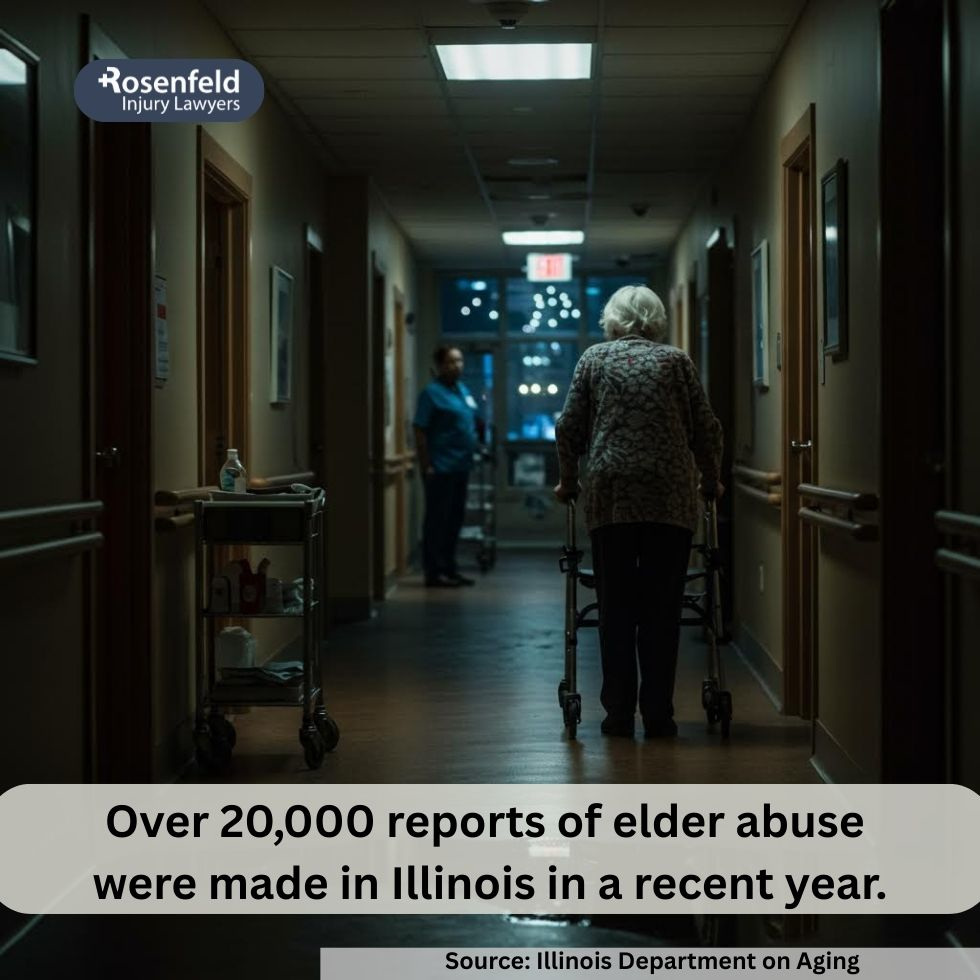
At Rosenfeld Injury Lawyers, our top-rated nursing home abuse lawyers have built a reputation on results, professionalism, and relentless advocacy for nursing home residents who’ve suffered abuse and neglect.
We are members of the Million Dollar Advocates Forum, Super Lawyers, and active in the American Association for Justice and the Illinois Trial Lawyers Association. We maintain an AVVO rating of 10/10 and contribute regularly to The National Law Review.
Over the years, we’ve obtained over $450 million in verdicts and settlements for victims of nursing home abuse, including cases of physical abuse, sexual abuse, preventable falls, and fatal pressure sores. More importantly, we’ve stood with families through every step, investigating, explaining options, and fighting until justice is served.
At Rosenfeld Injury Lawyers, we handle the full spectrum of nursing facility abuse and neglect claims in Chicago. Each case is different, but they all share a common thread: vulnerable residents were failed by the very people entrusted with their care. Here are the most common types of home abuse and neglect we see.
This includes hitting, shoving, restraining, or otherwise inflicting physical harm on residents. We’ve represented clients where nursing home staff members or even other residents caused injuries ranging from bruises and fractures to long-term disability. Our team works with medical experts to prove the abuse and show how better staffing, training, or supervision could have prevented it.
Not all harm is visible. Verbal threats, intimidation, humiliation, and isolation can cause lasting trauma for elderly residents. Victims of mental abuse often suffer from anxiety, depression, or withdrawal from daily activities. In these cases, we gather witness testimony, facility records, and psychological evaluations to show the impact of this cruel conduct.
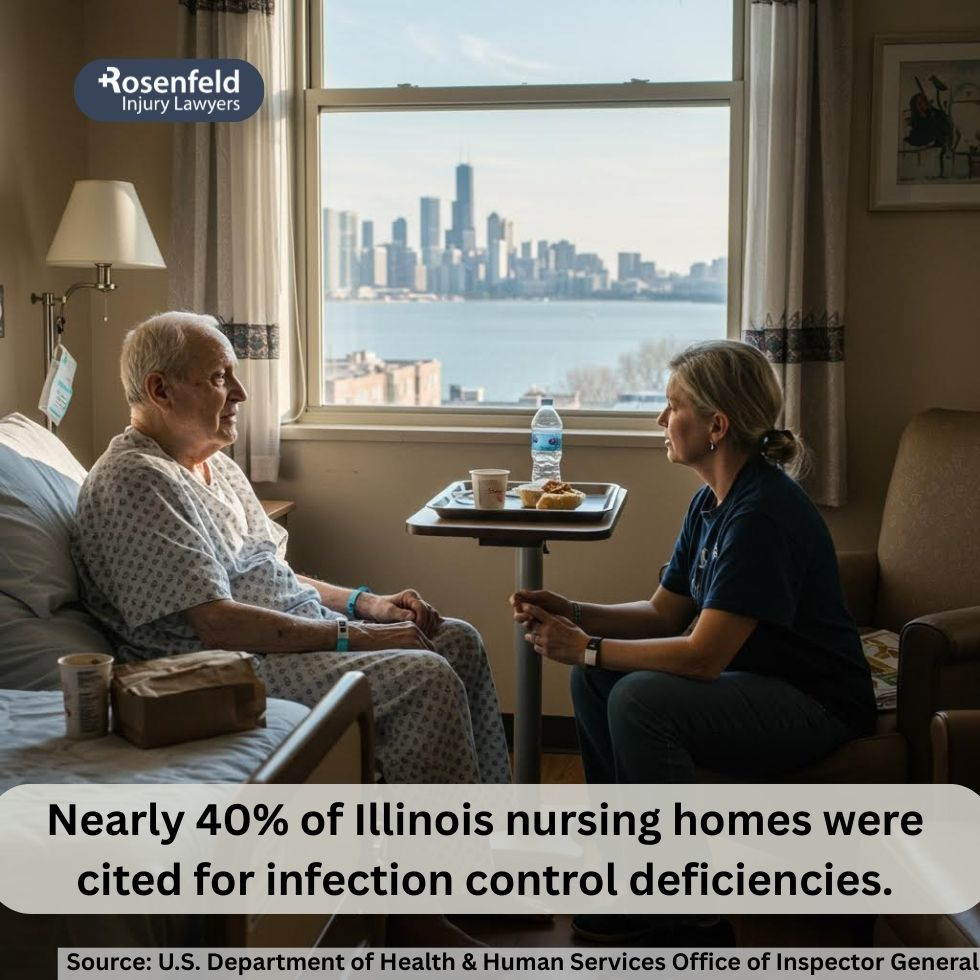
Sadly, we’ve handled nursing home abuse cases involving sexual assault of vulnerable residents. This type of abuse can cause devastating physical injuries and sexually transmitted diseases, as well as emotional trauma, including PTSD. In one of our largest settlements, two Chicago women were assaulted by a CNA. We use forensic evidence, prior complaints, and expert testimony to hold facilities accountable for failing to protect their residents.
Neglect occurs when nursing homes fail to provide adequate medical care, supervision, or basic needs such as food, hydration, hygiene, or safe environments. Examples include falls due to missing bed alarms, untreated infections, or medication errors.
While not always intentional, this type of abuse or neglect can be just as deadly as outright nursing home misconduct.
Some residents are manipulated or coerced into giving away money or property, or they lose control over their own financial affairs due to dishonest caregivers or administrators. Our role is to trace financial records, expose unauthorized transfers, and fight to recover stolen assets for victims and their families.
Through our work, we’ve seen that nursing home abuse rarely happens by accident. Instead, it’s usually the result of systemic problems inside a nursing home facility or corporate cost-cutting that puts profits over people. The most common causes of abuse in a nursing home setting include:
The injuries we see most often tell the real story of how dangerous nursing home neglect and abuse can be. Some injuries heal with time, but others permanently change a resident’s quality of life or even result in fatality. The most common include:
When a resident suffers harm in a Chicago nursing home, the law allows victims and their families to pursue compensation. While every case is different, the categories of damages that can be awarded include:
Our role as nursing home abuse lawyers is to maximize these recoveries by proving every layer of harm through medical records, expert opinions, and facility documentation.
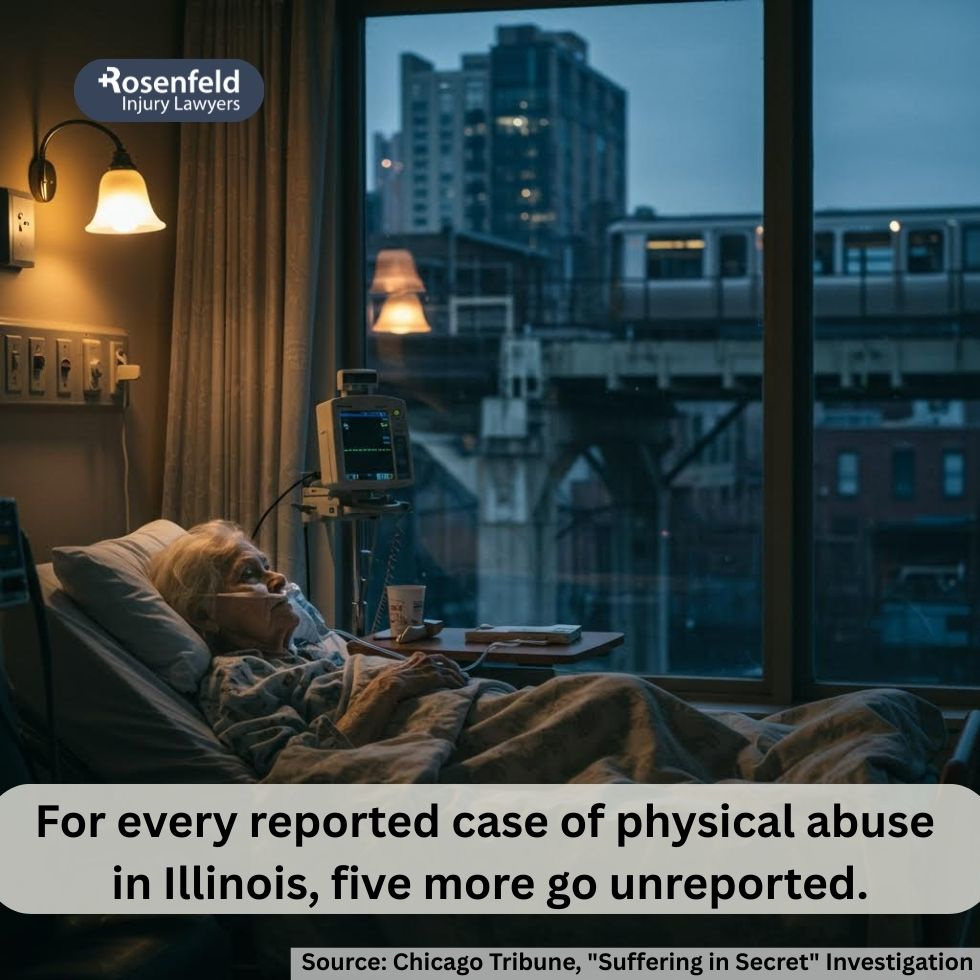
The average nursing home abuse payout in Chicago is $711,800, with a median of $610,000. Reported case values generally fall in a range from $125,000 to nearly $1.9 million.
The value of a case depends on several factors, including:
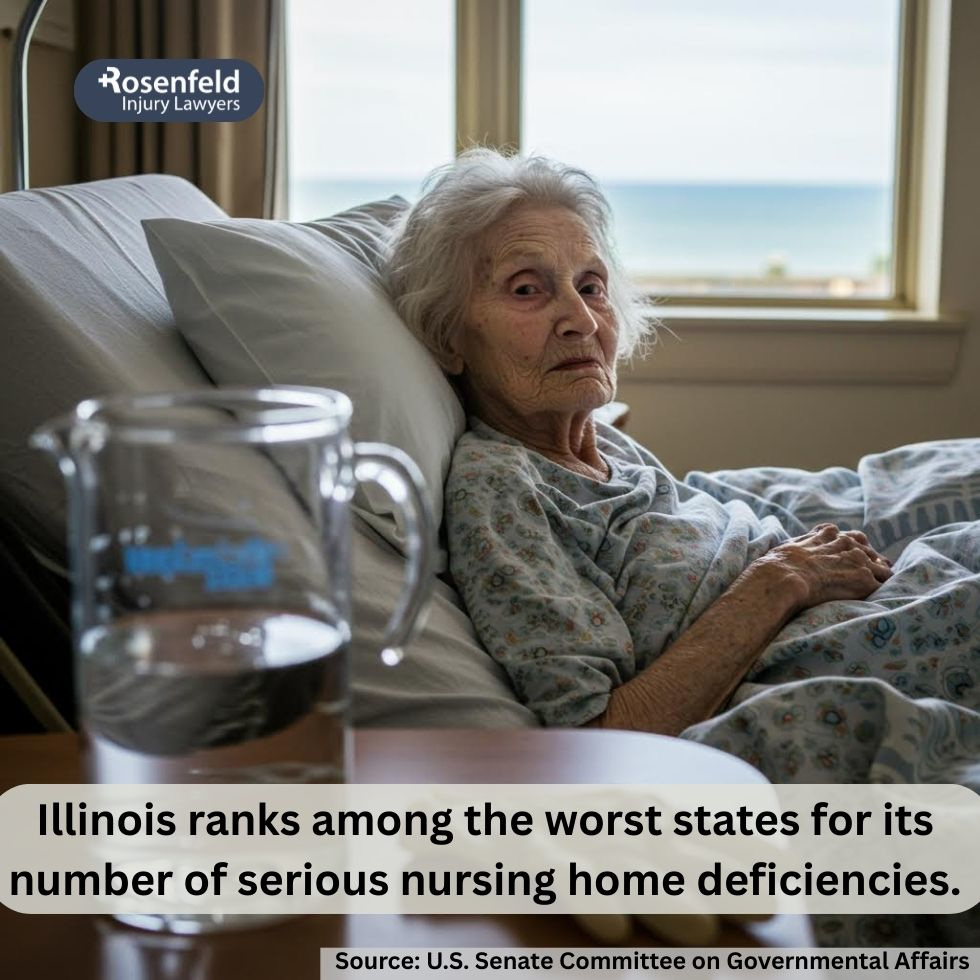
Nursing home negligence cases are among the most challenging areas of civil litigation. Experienced elder abuse lawyers will perform a detailed investigation to piece together what really happened. We counter large corporate defense firms with expert witnesses and medical testimony.
As nursing home abuse attorneys, our role is to level the playing field, build strong cases, and fight for justice, whether that means a settlement or taking the case to trial in a Chicago courtroom.
On July 30, 2025, there were at least 38 nursing homes cited for abuse in Chicago, and at least one was part of the Special Focus Facility (SFF) program. SFF facilities are subject to more frequent inspections, escalating penalties, and potential termination from Medicare and Medicaid services.
Not every nursing home in Chicago provides safe and consistent care. Public records show that some facilities have been repeatedly cited for serious deficiencies, fined large amounts, or flagged for chronic quality issues. Here are a few examples:
Nursing home abuse cases in Chicago are guided by a mix of federal, state, and local laws that establish both resident rights and facility obligations. At the federal level, the Nursing Home Reform Act of 1987 (part of the Omnibus Budget Reconciliation Act, OBRA 1987) set national standards for care in facilities that receive Medicare or Medicaid funding.
Importantly, in the Illinois Supreme Court case Harris v. Manor Healthcare Corp., the court held that nursing home residents and their families can bring private lawsuits for violations of this act, rather than relying solely on regulators like the Illinois Department of Public Health (IDPH) to issue fines or penalties.
Other federal protections include the Elder Justice Act of 2010 and the Older Americans Act, both designed to address elder abuse and improve accountability in long-term care.
Illinois law adds further layers of protection. The Illinois Nursing Home Care Act (210 ILCS 45/) is one of the most powerful statutes in the country, giving residents the right to sue facilities directly for violations of their care.
Other state laws include criminal statutes against abuse or neglect of long-term care residents (720 ILCS 5/12-4.4a), the Illinois Abused and Neglected Long-Term Care Facility Residents Reporting Act (210 ILCS 30/), which mandates reporting of suspected abuse, and the Adult Protective Services Act (320 ILCS 20/), which provides statewide protection for vulnerable adults.
Locally, Chicago has programs under the Municipal Code (2-50-090 et seq.) that promote reporting and prevention of abuse in nursing homes. These local rules work in tandem with state and federal laws to create multiple avenues of accountability.
Together, these legal protections ensure that residents of Illinois nursing homes have clear rights and that families can pursue justice when abuse occurs.
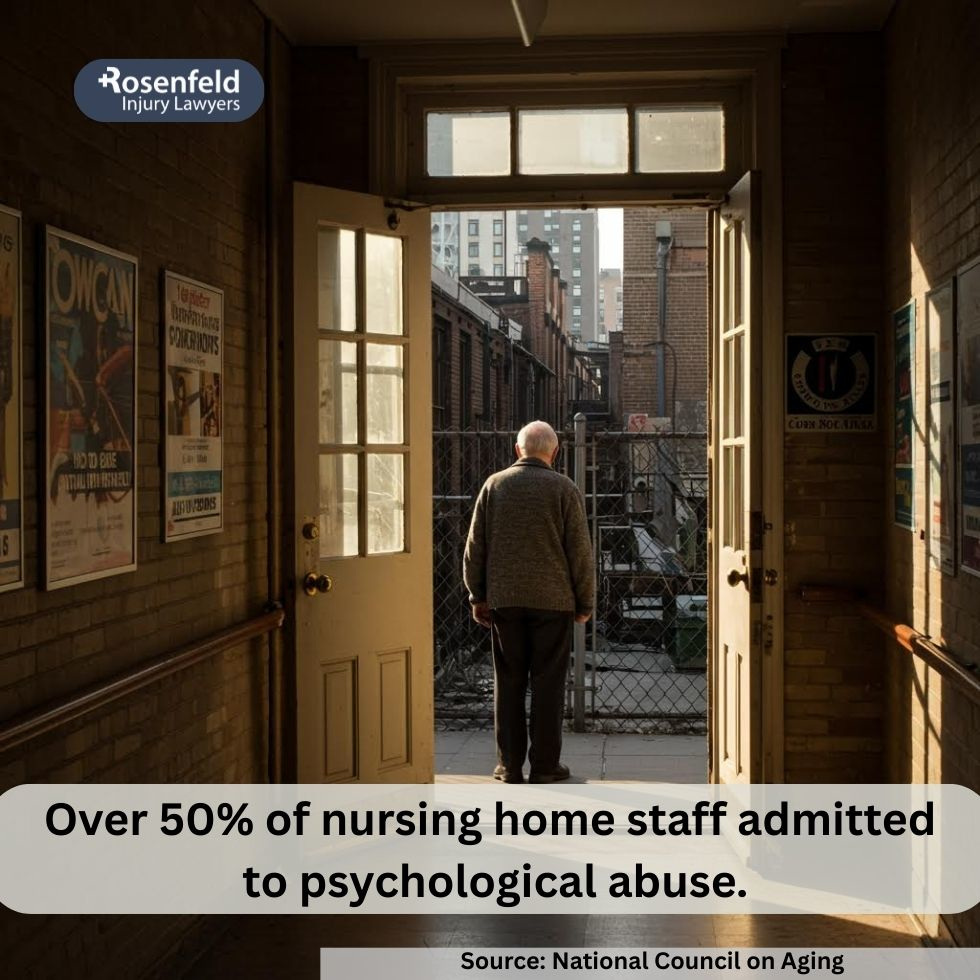
In Illinois, most personal injury lawsuits—including those involving nursing home abuse or neglect—must be filed within two years under the state’s statute of limitations (735 ILCS 5/13-202) – Statute of limitations for personal injury (2 years).
If the abuse results in a resident’s death, the Illinois Wrongful Death Act (740 ILCS 180/) applies, giving families two years from the date of death to bring a claim.
That said, the clock doesn’t always start ticking immediately. In some cases, the abuse isn’t discovered until much later, such as when hidden medical records are uncovered or a family realizes that pressure sores, fractures, or unexplained injuries were linked to neglect. Illinois law allows for tolling, meaning the deadline can be extended when the harm could not reasonably have been discovered earlier.
Because these rules can be complex, it’s crucial for families to contact a Chicago nursing home abuse lawyer as soon as possible. Acting quickly gives us the best chance to investigate, preserve evidence, and file within the required time frame so that no rights are lost.
One of the most important steps in a nursing home abuse lawsuit is determining who is legally responsible for the harm. In many cases, liability starts with the nursing home facility itself. These corporations are required to provide adequate staffing, training, and supervision. When they cut corners or ignore safety rules, they can be held accountable for injuries and fatalities.
Individual staff members may also be liable, particularly in cases involving direct physical abuse, sexual assault, or intentional neglect. Administrators and managers can face liability if they engage in negligent hiring, fail to perform background checks, or ignore repeated complaints about unsafe conditions.
In some cases, third-party contractors are also responsible. For example, medical providers working inside a facility, transportation vendors, or even outside security contractors may share liability if their negligence caused harm to residents.
By investigating every angle, we identify all possible defendants. Holding everyone accountable ensures the strongest possible case and the best chance of securing justice for nursing home residents and their families.
When we bring a nursing home neglect lawsuit, facilities rarely admit fault. Instead, they raise defenses aimed at avoiding responsibility. One of the most common is to blame the resident’s pre-existing condition, arguing that bed sores, falls, or infections were inevitable because of age or illness. Facilities may also claim contributory negligence, suggesting that the resident caused their own injuries by refusing care or not following instructions.
Another defense is the argument of “no proximate cause.” In other words, the facility admits something went wrong but denies that their neglect directly caused the injury or death. Finally, some nursing homes point to compliance with minimum state or federal standards, arguing that meeting the baseline is enough to shield them from liability.
We challenge the idea that compliance with minimum standards is enough by demonstrating the higher duty of care owed to vulnerable residents. By anticipating these defenses, we build stronger cases that maximize recovery for victims of nursing home abuse and neglect.
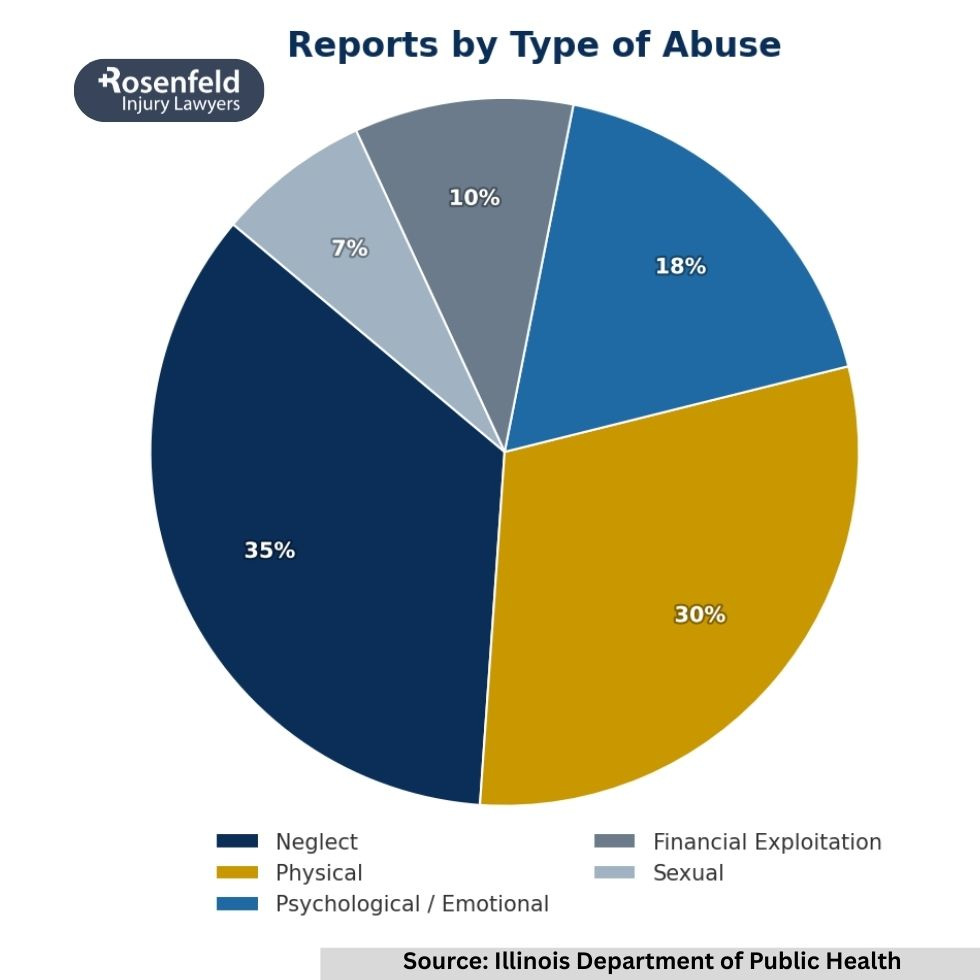
Families often feel powerless when they first suspect neglect or abuse in a nursing home, but taking the right steps early can make a huge difference in the strength of a case. Here are the most important things you can do:
When a family comes to us after discovering nursing home abuse or neglect, our job is to take immediate action. Here’s how we help:
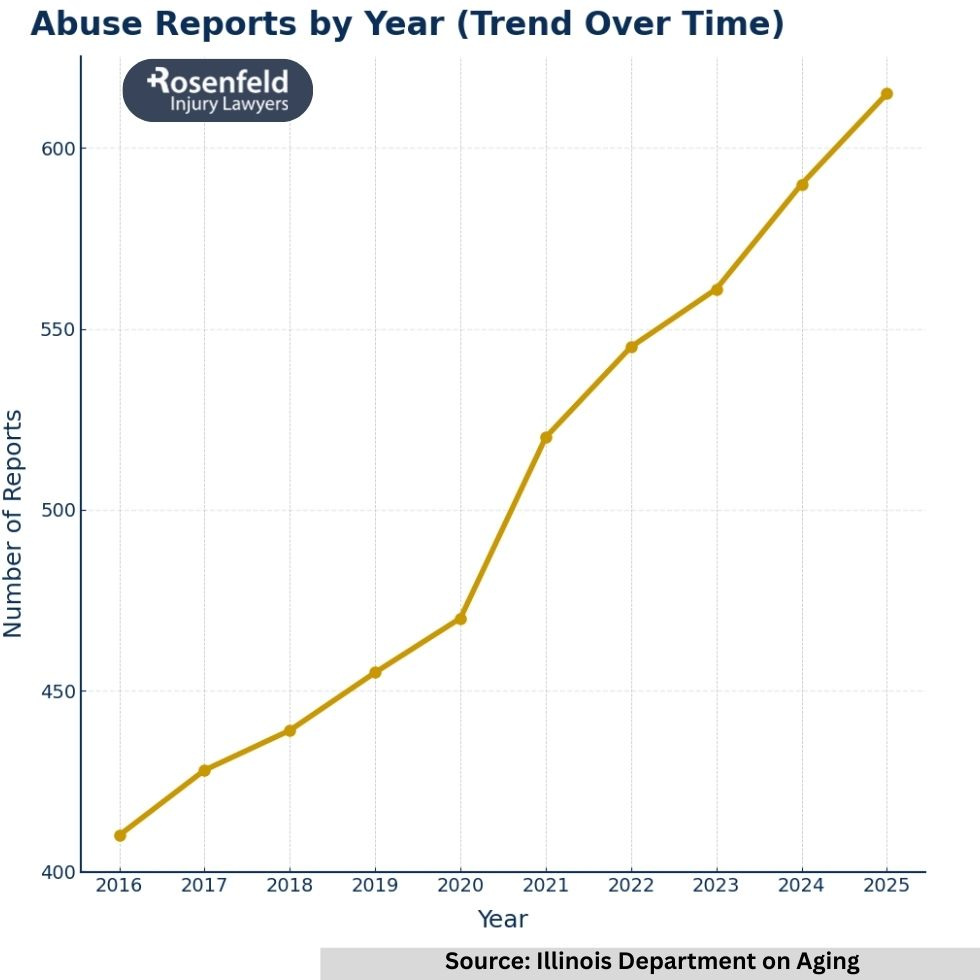
Common signs of nursing home abuse include unexplained injuries, sudden changes in mood, weight loss, poor hygiene, untreated infections, and withdrawal from social activities. Families should pay attention to these signs of nursing home elder abuse, as they often point to deeper issues.
Abuse generally refers to intentional harm, such as physical abuse or sexual assault. Neglect means a failure to provide necessary care, like not assisting with meals, turning residents to prevent pressure sores, medication errors, or failing to supervise known fall or mental illness risks.
Yes. The Illinois Nursing Home Care Act protects residents against emotional abuse. Verbal threats, humiliation, or isolation can support a valid claim.
The Illinois Department of Public Health oversees Chicago nursing homes. Facilities are subject to inspections, citations, and fines for violations.
If you suspect nursing home abuse, you can call the IDPH Nursing Home Hotline at 1-800-252-4343, which is available 24/7. Families can also file complaints directly through IDPH’s online portal. For cases involving elder abuse in the community, the Adult Protective Services program accepts reports at 1-866-800-1409.
Nursing home patients, family members, or an estate representative can bring a lawsuit against a negligent nursing home facility.
A surviving spouse, child, or other next of kin may file under the Illinois Wrongful Death Act.
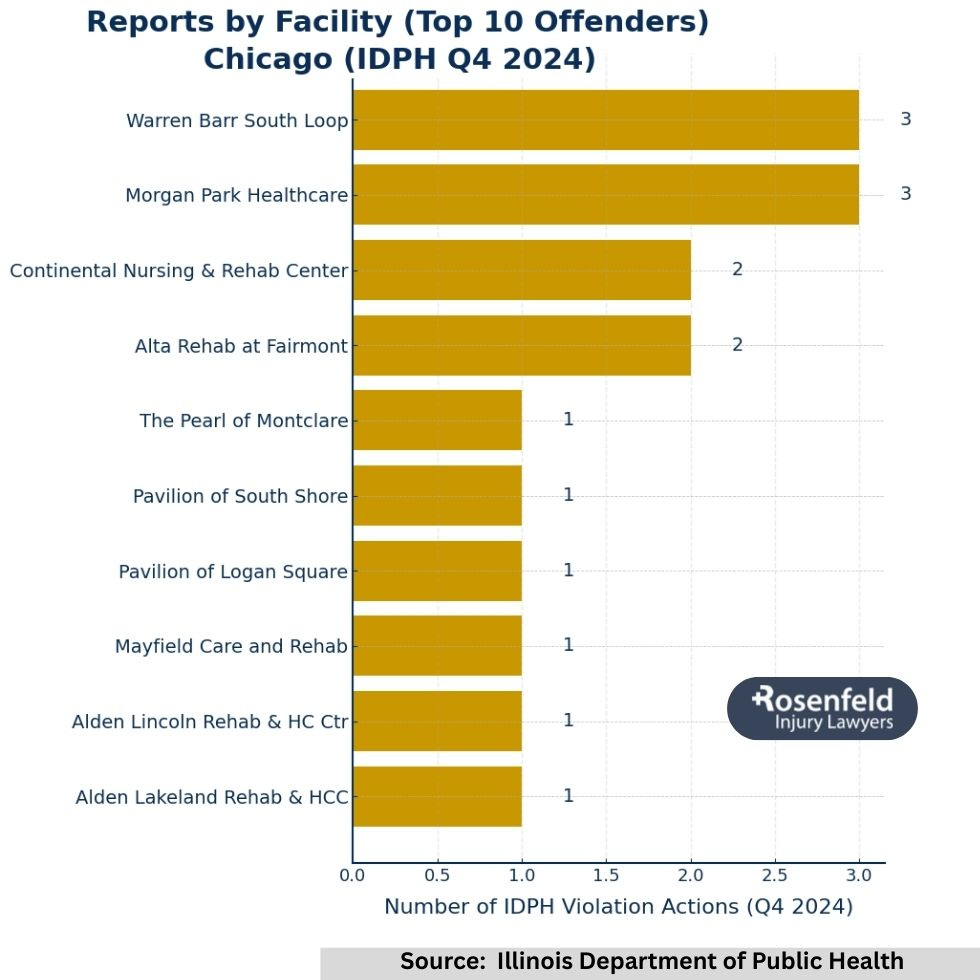
Strong evidence includes facility records, photos of injuries, witness testimony, facility violation reports, and correspondence with staff or administrators.
A contract isn’t required to bring a nursing home neglect lawsuit. Claims are based on statutory rights and duties under Illinois law, including the Nursing Home Care Act.
The process involves investigation, filing a complaint in Cook County Circuit Court, exchanging evidence during discovery, negotiating with defense counsel, and, if necessary, presenting the case to a jury.
No. Many are resolved through settlement once strong evidence is presented. Our approach is to prepare every case as if it will go to trial, which often increases settlement value.
Our law firm represents clients on a contingency fee basis, which means you pay nothing up front. Our fee is only collected if we secure a recovery on your behalf.

If you believe your loved one has suffered abuse or neglect in a nursing home, don’t wait to take action. The sooner an investigation begins, the easier it is to preserve evidence, secure facility records, and hold the facility accountable.
At Rosenfeld Injury Lawyers, our Chicago nursing home attorneys have decades of experience standing up for residents and their families in Cook County and across Illinois. We offer a free consultation to discuss your case, answer your questions, and explain your options. Our Chicago personal injury lawyers work on a contingency fee basis, which means you pay nothing unless we secure a recovery for you. Contact us for a free consultation today!
Our downtown office, near the Richard J. Daley Center, Dirkson United States Courthouse, and the Chicago Workers’ Compensation Commission, offers convenient access from Aurora, Joliet, and Waukegan via I-90, I-94, and I-290.
225 W Wacker Dr #1660
Chicago, IL 60606
Phone: (847) 835-8895
Toll Free: (888) 424-5757
We also serve clients from Champaign, Naperville, Schaumburg , Springfield and throughout Illinois.
All content undergoes thorough legal review by experienced attorneys, including Jonathan Rosenfeld. With 25 years of experience in personal injury law and over 100 years of combined legal expertise within our team, we ensure that every article is legally accurate, compliant, and reflects current legal standards.